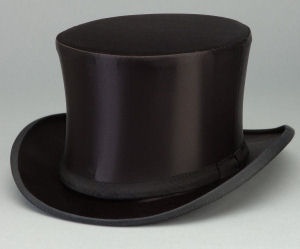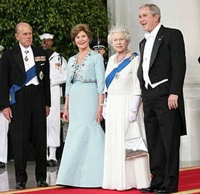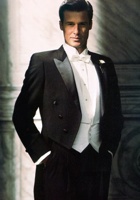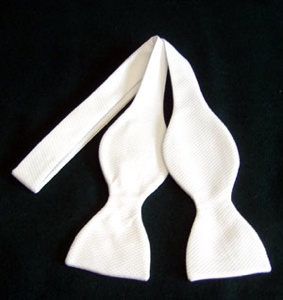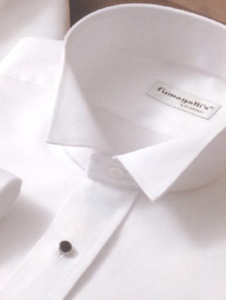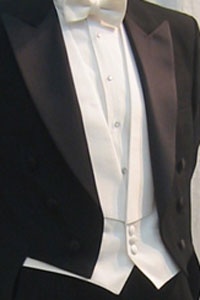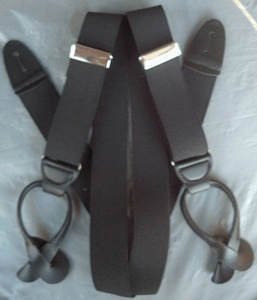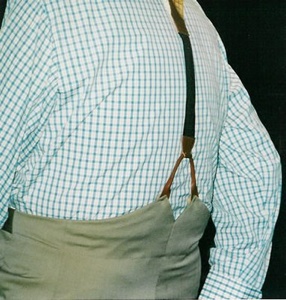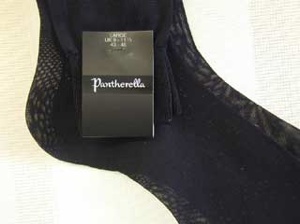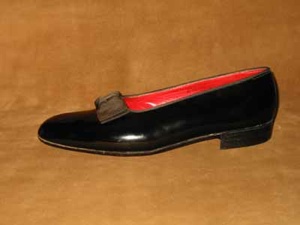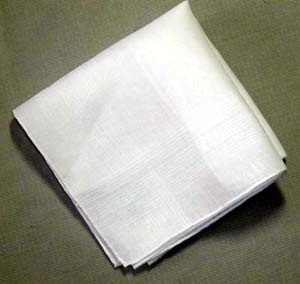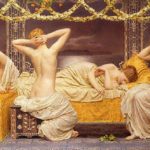The correct hat to wear to a white tie event is a top hat. The wearing of a hat is optional, but if you do wear one you should also wear an opera cloak or coat. White gloves, scarf and cane are optional extras. According to contemporary sources, the inventor of the top hat, John Hetherington, caused such fright in people when he first wore his hat, that he was taken to court for wearing “a tall structure having a shining luster calculated to frighten timid people”. An authentic top hat should be wider at the top and bottom than the middle, and should have a curved upturned rim.
Your jacket should be a tailcoat – it must have a cut front that reaches to your waist and there should not be any part of the white vest underneath showing below the front. These coats have a split in the tail and often buttons on either side. The tails at the rear should not fall below your knees. The lapels (peaked) of the jacket should be covered with silk, or even better with grosgrain. In the photograph above, you can see that President Bush is wearing an ill fitting off-the-rack suit because the jacket front is too short. The Duke of Edinburgh (left) is wearing a well fitting suit with the correct length. The photograph on the right is another demonstration of a correctly fitting jacket and vest.
Your bowtie must be hand tied – do not buy a tie on a string or with clasps. It is as easy to tie a bowtie as it is to tie a regular tie – take some time to learn how. A hand tied is distinctively different in appearance and people will know. The tie should be made from cotton pique. You will need to have your neck measured when buying this item as bow ties come in various sizes.
Your shirt should be made of white cotton with a stiff front made of white cotton pique. The shirt should have no buttons down the front and it should have a single cuff requiring cufflinks (this is called a link cuff shirt, and is not to be confused with French cuffs – double cuffs – which are worn with a dinner jacket). The shirt must have a stiff wing tip collar (normally also made with cotton pique) and you can optionally wear a more formal shirt with a detachable collar. The front of the shirt should be fastened with white (or silver, or diamond) studs, and the cuffs should be fastened with matching cufflinks. The tips of the shirt collar are meant to sit behind the tie.
Your vest must be long enough to cover your waist – you should see no sign of the top of your trousers – including your suspender buttons. This is not usually a problem if you are wearing the correct trousers (unlike President Bush in the photograph attached to item 9). The vest should be made with white cotton pique and it should have three mother-of-pearl buttons – you should fasten all three buttons (contrary to the normal practice on non-formal vests). You can get two styles of vest – one has curving lapels, and the other sharp. Both are equally fine but curving lapels tend to be favored by olden men and can make you look overweight. In the photograph above we see a correctly styled vest, but unfortunately the jacket is too short and should not be worn with the vest in question.
You must wear suspenders with white tie. They should be button fastened suspenders – they should not have clips on them. You absolutely must not wear a belt at the same time as braces. Remember, suspenders are underwear – they must never be seen. For that reason you are free to wear any color you like. Suspenders are worn over your shirt but under your vest.
The correct trousers for white tie are fishtail trousers. These trousers sit on the waist, not the hips, and the back is higher than the front with a split with buttons (on the inside – same with the front) in order to fasten your braces. An example is seen in the photo above, but you should wear black trousers that are made to go with your jacket. Your trousers should have a double stripe down the outside of both legs (a single stripe is for black tie trousers). The stripes on your trousers should be made of the same material as the facing on your jacket lapels (grosgrain or silk). The trousers should fall to the heel of your shoe at the back – no higher, no shorter.
This is likely to be the most unusual item for most men – you must wear knee high black silk socks. These are readily available on the internet and in upmarket department stores. The best brand is probably Pantherella (as seen above).
When wearing white tie you must not wear patent leather shoes. The correct shoes are opera pumps which have a grosgrain bow on the front (as seen above). If you can not find opera pumps or do not own a pair, you can wear very high quality fine calves skin shoes – these are often sold as dancing shoes. You may also optionally wear formal slippers if you are hosting the white tie event (these are never worn outside of your own home). They are normally made of velvet and have an emblem stitched on the front. Opera pumps take a lot of getting used to if you are new to them as they do look a lot like women’s shoes without the high heel. Opera pumps are usually made of very fine high quality leather – they should not be made with patent leather.
The best type of handkerchief with white tie is fine linen – not silk. If you can not find a fine white linen handkerchief, silk is an acceptable alternative. The handkerchief must be white. The handkerchief should be folded (or puffed) and placed in the front pocket of your jacket so it is visible. If you wish to wear a flower in your lapel instead, you should generally not wear a handkerchief – though this is considered an acceptable practice it is not common. Keep an extra handkerchief in both of your trouser pockets – one for you in case you need it, and one in case you meet a lady in distress. Never use the handkerchief in your jacket pocket – it is for show only. You should also remember that it is considered extremely rude for any person to touch another person’s front handkerchief or tie. Many thanks to Persephone who very kindly wrote a list of 8 points for ladies who are attending a white tie event. This is her 8 tips in their entirety: I am a lady, therefore, I would not personally wear white tie. However, my husband does and we have been to several formal (i.e., white tie) functions in Europe and the United States. At least two people wanted to know a bit more about correct ladies’ attire, and with the permission of the Mr Frater, I will elaborate a bit.
- Dress As Mr Frater wrote, the dress can be of any colour. If there is an opening cotillion, very common at Austrian balls, regular guests should not wear white as pure white is reserved for debutantes. For a white tie function, especially one that involves dancing (e.g., Vienna Opera Ball in Austria), ladies wear a ball gown. A ball gown can be sleeveless, have short sleeves or even long sleeves (suitable for older ladies). The bodice is figure-hugging, whereas the skirt is full. Suitable fabrics are silks (silk satin, crepe, brocade, taffeta, dupioni, etc.), cotton (cotton satin or sateen, in the summer even cotton muslin) or various blends. A ball gown can be a two-piece ensemble, but the top and skirt must match. Here is an example of a ball gown.
- Outerwear The proper outerwear for a ball gown is a cloak. I have a black cotton velvet cloak that I wear during the traditional ball season. During the summer months, a simple silk shawl or a short matching bolero evening jacket (as pictured with the dress above) will suffice. Here’s a vintage evening cloak.
- Shoes and Stockings No sandals! Shoes must have closed toes and can be made of leather, satin, silk and in a colour that complements the dress. I usually wear black pumps and then switch into my ballroom dancing pumps. Stockings are a must for a formal event. Sorry, there no ifs and buts.
- Handbag A small evening handbag made of satin or silk usually looks best. You can either have one that matches or complements your dress.
- Jewellery Wear your tiara if you have one, and your best jewels. Watches are not worn, even if they are covered with diamonds.
- Gloves The proper gloves for a sleeveless of short-sleeved gown are opera gloves. For a long-sleeved dress, one may wear shorter gloves. Gloves are measured in buttons, an ancient French standard. The proper length is anywhere from 12 buttons (right above the elbow) to 18 buttons (middle of upper arm). Please avoid the 20 buttons as they look like you’re attending a fetish function or are about to star in a burlesque act. Not that there is anything wrong with that, but there is a time and place for everything. Traditionally, gloves are white, made out of kid leather and have a mousquetaire opening at the wrist, so a lady can eat and drink without completely removing her gloves. Gloves should always be worn when dancing, but hands must never be covered when eating. A lady may sip some champagne/water/wine, etc. while wearing gloves. Also, jewellery such as rings, bracelets, etc. are worn under not over the gloves. If you cannot fit them, don’t wear them if you’re bringing gloves. I see so many ladies who are trying to be elegant, wearing their rings over their gloves and eat dinner with them. I guess they just don’t know any better, but those of us who do, think it looks ridiculous. Kid gloves are expensive ($200+ per pair), but if you treat them well, they will last a lifetime. They may be lined with silk or unlined. Some are even washable. Here’s a great online place. If you don’t want to spend that much money, white or ivory silk is an acceptable alternative. Personally, I would abstain from anything coloured and polyester/nylon/spandex. Many ladies wear them, but they just don’t look very nice.
- Make up Tasteful and appropriate for you and the occasion. False eyelashes, eye shadow up to the brows, neon pink lipstick and two-inch neon pink talons are neither tasteful nor appropriate.
- Hairstyles Hair is usually in an updo, especially if there is dancing. You can wear your hair down, but many ladies prefer total or partial updos because the tiaras just look and fit better. This is probably a good time to point out that white tie is evening wear – it should not be worn in the daytime. The same is true of black tie – neither should be worn before 6 o’clock in the evening. Read More: Facebook Instagram Email
